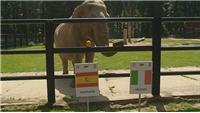

Great things were predicted for Lee Sharpe when he made his England debut but his experience proves how fragile international careers can be.
Last week's England squad announcement – with the welcome news of two debutants, Jack Rodwell and Daniel Sturridge, joining a number of other young players in the national set-up – got me thinking about what it is like to receive a first senior call-up and the hurdles those players may face.
It is natural to assume that young players simply need to put in a good performance on the pitch to secure their England future. But the reality is far more complex. A place in an England side is dependent on so much more than what happens over the course of 90 minutes: there is a whole new set of challenges that can easily derail a youngster.
An England call-up is life changing. Suddenly the whole country knows who you are and shenanigans that were ignored a fortnight ago can become headline fodder as your name takes on the additional tag, England international, rendering everything you say or do of increased significance. Your voice becomes louder, and having a microphone for your opinions – such as Twitter – can be dangerous, with even minor criticisms of the national set-up potentially jeopardising future selection. Some players can handle it, others can't. Over the years I've witnessed both, with even talented players falling by the wayside.
Some players fall into the trap of thinking they have made it, dreaming of how much money they are likely to make now they have an England cap. It is true that an England call-up turns heads. It can open the door to a better contract, a more regular first-team place, or a lucrative move to another club. Such choices are fantastic, but it is not always easy to make the right decisions. Agents, say, may be pressurising you to make a move before you are ready. It can be a very precarious time, because you are not yet an established player.
When I was a young player at Watford there was a lot of excitement around Lee Sharpe at Manchester United and Carl Tiler, who joined Nottingham Forest for £1.4m. Crucially, neither followed the career trajectory predicted for them. A place in the England team can be a fragile existence – it is simply a start, not a finish, and what happens next depends on plenty of hard work and commitment.
In my own career a number of successful appearances at Under-21 level paved the way for me to sign for Liverpool. Suddenly I felt I was on this incredible trajectory, going up and up. It felt like the whole world thought I was the best thing since sliced bread and I wanted it to last forever. Yet within two months I went from being the bee's knees to getting bombed out of the side with barely a first-team game for the rest of the season. None of that helped my England chances.
People are wont to say that playing for your country means nothing these days, but, believe me, getting an international cap is a landmark moment that players obsess over. After moving to Liverpool I was desperate to get my first senior call-up, and distraught when it did not come. I wondered if I had missed the boat and suddenly club football no longer seemed to satisfy me. Disillusioned with English football my agent at the time called to say that clubs in Spain and Italy were interested in signing me and I seriously considered a move.
I stayed at Liverpool, of course, and finally received a call-up to the Euro 96 standby squad under Terry Venables. It should have been my moment to prove myself, but instead I handled the opportunity badly. Holed up in the team hotel for a few weeks I got cabin fever and started fooling around. I trashed Alan Shearer's room, tipped his bed over and generally made a mess thinking it was funny. Understandably, he wasn't at all impressed. We weren't mates at the time so it couldn't even be construed as friendly banter.
I know that if a young player did that to me now I'd be furious, but back then I was immature and completely unaware of how my behaviour could affect my England career. Ultimately, if your personal ability on the pitch is outweighed by a tendency to upset the star players in the team you may well find yourself expendable. That incident was probably the undoing of my England career, and I was quickly out of the frame after that, making my senior debut only at the age of 26.
I have seen similar things happen to others. Personality counts for a lot – from a consummate professional such as James Milner, to the overexcited chirpy ones who can't quite settle down. I sound like an old man saying this, but all that youthful exuberance can cause problems and I often think "pipe down a couple of decibels and do your best to fit in". Those who have failed to do so have landed out on their ear and never made it back.
Handling that environment is a huge challenge for a young man. Just being part of a team with players such as Rio Ferdinand and Wayne Rooney can leave them starstruck. It is one thing to play against big names in the Premier League, or say hello to them in the tunnel, but being their team-mate brings new pressures. Essentially, you are fighting for your place and that can make other players tetchy and defensive.
Before an international friendly, when fringe players tend to be involved, there is typically a lot of gossiping about who deserves to be in the squad and who does not. There is pressure on both sides and a feeling of tension and uncertainty that younger players will no doubt pick up on.
All the more reason, then, to celebrate the longevity of players such as Rooney and Spain's Iker Casillas. Both were just teenagers when they made their senior international debuts and yet both have remained at the very top all these years later. Now with 73 and 125 caps respectively, their international career achievements are truly extraordinary. It would be fantastic if, in years to come, we could look back at the current crop of youngsters joining the national set-up and say the same thing.
- Arbeloa: Spain must never change their style
- Wedding bells turn Iniesta's legs to jelly
- Pele: Brazil's 1970 World Cup winners better than Spain
- Pirlo: Only Spain are superior to Italy
- Spain disproved boring tag with empathic final win, insists Alonso
- Fernando Torres revels in Euro 2012 crown
- Italy can reach the final at World Cup 2014
- Johan Cruyff: I enjoyed Italy and I'm a big fan of Del Bosque's Spain
- De Gea & Mata named in Olympics squad
- Shevchenko: Euro 2012 was a success for Ukraine
Hot News
- Funny Balotelli!
- Spanish fans celebrate Euro Cup win
- That's German WAGS!
- The sexy female fans in Euro 2012
- Euro 2012: Spain fans celebrate victory
- Spain vs Italy in clash of the Euro WAGs
- Euro 2012 Final - Spain 4 : 0 Italy, Part 2
- Germany knocked out by Italy
- Natalia Siwiec blasts Sol and the BBC
- Coleen Rooney reveals her bikini body secrets
- Italy's fans celebrated wildly
- Euro 2012 Final - Spain 4 : 0 Italy, Part 1
| Rank | Team | W/D/L | Pts |
|---|
Cities & Stadiums
The Top 3 Teams of Previous Tournaments
| Year | Winners | Runner-up | Third place |
|---|---|---|---|
| 2008 | Spain | Germany | Russia / Turkey |
| 2004 | Greece | Portugal | Netherlands / Czech Republic |
| 2000 | France | Italy | Netherlands / Portugal |
| 1996 | Germany | Czech Republic | France / England |
| 1992 | Denmark | Germany | Netherlands / Sweden |
| 1988 | Netherlands | Soviet Union | Italy / West Germany |
| 1984 | France | Spain | Denmark / Portugal |
| 1980 | West Germany | Belgium | Czechoslovakia |
| 1976 | Czechoslovakia | West Germany | Netherlands |
| 1972 | West Germany | Soviet Union | Belgium |
| 1968 | Italy | Yugoslavia | England |
| 1964 | Spain | Soviet Union | Hungary |
| 1960 | Soviet Union | Yugoslavia | Czechoslovakia |




